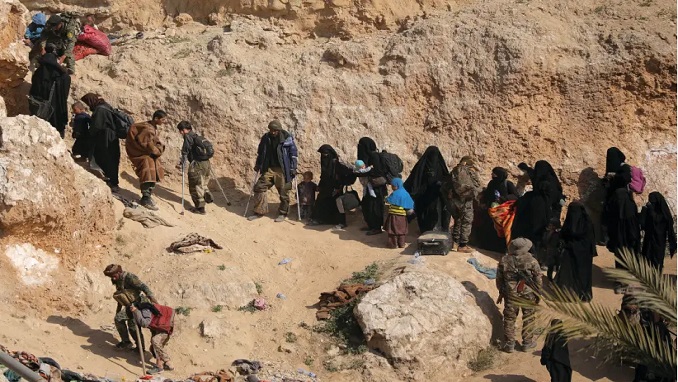Two women have been abducted and murdered in eastern Syria. These appear to be the latest murders carried out by ISIS against the US-backed Syrian Democratic Forces and their civilian authorities, The Jerusalem Post reports.
The women were found murdered in the countryside of Hasakah, according to Kurdistan24, which based its report on the Syrian Observatory for Human Rights.
They were both officials of the Autonomous Administration of North and East Syria. Hind Laif al-Khadir and Sa’da Faysal al-Hermas were the co-chairwomen of a local council. They were kidnapped and found killed in al-Dashisha, Kurdistan24 reported. This area is one of many that the SDF liberated from ISIS years ago.
“The Hasakah Canton’s Council confirmed in a written statement the assassination of two of their administration officials, after their abduction by unknown gunmen, believed to be affiliated with ISIS sleeper cells, yesterday in Shadadi area,” the Syria-based Rojava Information Centre (RIC) wrote in a tweet.
Mohammad Ibrahim, a local researcher and analyst focused on northeast Syria, told Kurdistan 24, “The area of Dashishah was well known as ISIS HQ in Hasakah province. A few weeks ago, the SDF raided some areas there and allegedly arrested ISIS-linked cells.”
He explained that the town has also witnessed additional attacks this month against members of the Kurdish-led Syrian Democratic Forces (SDF), saying, “The sparsely inhabited areas adjacent to the Iraqi border allow ISIS cells to sneak across the border.”
The SDF is an armed force that defeated ISIS in Raqqa in 2017 and finally crushed the last pockets of ISIS in March 2019. However, ISIS “sleeper cells” and networks remain active, and there are weekly raids against the group.
In recent weeks, the jihadist group appears to have begun a resurgence, attacking Syrian regime forces west of the Euphrates and carrying out a large twin bombing in Baghdad.
ISIS is able to operate because it does so over a large area controlled by different groups, including the Iraqi Security Forces, the Syrian regime and SDF. It also operates in Turkish-occupied areas of northern Syria. The US killed ISIS-leader Abu Bakr al-Baghdadi in October 2019 just a few kilometers from the Turkish border.
Many ISIS members have transited Turkey or fled from Syria to Turkey. Turkey was also a conduit for ISIS fighters entering Syria in 2014 and 2015, when tens of thousands transited. Ankara claims to be cracking down on ISIS, but evidence shows the group has seen Turkey as a kind of rear base of operations and a place it can draw support from fellow travelers.
The targeting of women leaders in eastern Syria is also part of a wider pattern. Turkish-backed extremists have especially targeted women in areas they occupy, such as Afrin and Tel Abyad. They have kidnapped dozens of women in Afrin and held them in illegal secret prisons.
Hevrin Khalaf, a Kurdish female activist, was murdered by Turkish-backed extremists in October 2019. ISIS, like the Taliban, Boko Haram and other religious extremist groups, views women as a threat and targets teachers, administrators and females who are active in society.
The women killed recently in eastern Syria worked in the local council of Tel al-Shayer (Tel al-Chayir) in Syria. Online rumors that suggested ISIS had “beheaded” them appeared to be intended to spread fear. However, gruesome photos posted online appeared to show that both women were shot in the head.
There is some debate about which account is accurate. When it comes to eastern Syria, many people on social media, even some who claim to be experts or journalists, often spread misinformation, so it is difficult to get clarity. Claims that the women were beheaded appear to be contradicted by the photos.
Assassinations of local officials are a way for enemies of stability to spread chaos. For instance, some Bedouin tribes have seen their members targeted in areas east of the Euphrates across from Deir Ezzor. It is not always clear if this is done by ISIS, Syrian regime elements or by those linked to Turkey or local feuds.
The lack of security is usually used as an excuse to blame the SDF for not doing enough. On the other side of the coin, when the SDF does use a heavy hand, it is then accused of not listening to locals.
Targeting of women is generally used to send a message to local councils not to include them in governance. The civilian authorities in eastern Syria have sought over the years to have women co-chair local governing institutions.
